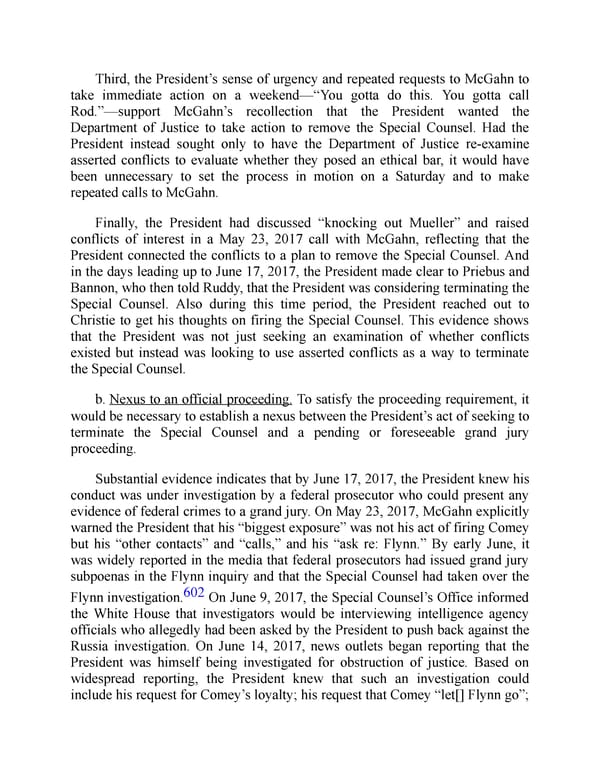Third, the President’s sense of urgency and repeated requests to McGahn to take immediate action on a weekend—“You gotta do this. You gotta call Rod.”—support McGahn’s recollection that the President wanted the Department of Justice to take action to remove the Special Counsel. Had the President instead sought only to have the Department of Justice re-examine asserted conflicts to evaluate whether they posed an ethical bar, it would have been unnecessary to set the process in motion on a Saturday and to make repeated calls to McGahn. Finally, the President had discussed “knocking out Mueller” and raised conflicts of interest in a May 23, 2017 call with McGahn, reflecting that the President connected the conflicts to a plan to remove the Special Counsel. And in the days leading up to June 17, 2017, the President made clear to Priebus and Bannon, who then told Ruddy, that the President was considering terminating the Special Counsel. Also during this time period, the President reached out to Christie to get his thoughts on firing the Special Counsel. This evidence shows that the President was not just seeking an examination of whether conflicts existed but instead was looking to use asserted conflicts as a way to terminate the Special Counsel. b. Nexus to an official proceeding. To satisfy the proceeding requirement, it would be necessary to establish a nexus between the President’s act of seeking to terminate the Special Counsel and a pending or foreseeable grand jury proceeding. Substantial evidence indicates that by June 17, 2017, the President knew his conduct was under investigation by a federal prosecutor who could present any evidence of federal crimes to a grand jury. On May 23, 2017, McGahn explicitly warned the President that his “biggest exposure” was not his act of firing Comey but his “other contacts” and “calls,” and his “ask re: Flynn.” By early June, it was widely reported in the media that federal prosecutors had issued grand jury subpoenas in the Flynn inquiry and that the Special Counsel had taken over the 602 Flynn investigation. On June 9, 2017, the Special Counsel’s Office informed the White House that investigators would be interviewing intelligence agency officials who allegedly had been asked by the President to push back against the Russia investigation. On June 14, 2017, news outlets began reporting that the President was himself being investigated for obstruction of justice. Based on widespread reporting, the President knew that such an investigation could include his request for Comey’s loyalty; his request that Comey “let[] Flynn go”;
 Mueller Report PDF Page 354 Page 356
Mueller Report PDF Page 354 Page 356